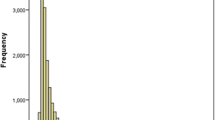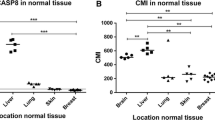Abstract
The association between promoter methylation status and survival was investigated in a large cohort of women with breast cancer, participants in the Long Island Breast Cancer Study Project. Archived tumor tissues (n = 839) were collected from women diagnosed with a first primary invasive or in situ breast cancer in 1996–1997. Vital status was followed through the end of 2005 with a mean follow-up time of 8 years. Promoter methylation of eight breast cancer-related genes was assessed by MethyLight. The frequencies of methylation for HIN1, RASSF1A, DAPK1, GSTP1, CyclinD2, TWIST, CDH1 and RARβ were 62.9, 85.2, 14.1, 27.8, 19.6, 15.3, 5.8 and 27.6%, respectively. Since survival rates of in situ and invasive breast cancers are substantially different, survival analyses were conducted within 670 invasive cases with complete data on all genes. Age-adjusted Cox proportional hazards models revealed that GSTP1, TWIST and RARβ methylation was significantly associated with higher breast cancer-specific mortality. Methylation of GSTP1 and RARβ was significantly associated with higher all-cause mortality. To investigate the relationship between the number of methylated genes and breast cancer-specific mortality, we included previously published MethyLight data on p16 and APC methylation status. Breast cancer-specific mortality increased in a dose-dependent manner with increasing number of methylated genes (P trend = 0.002), although confidence intervals were wide. Our results suggest that promoter methylation, particularly for a panel of genes, has the potential to be used as a biomarker for predicting prognosis in breast cancer.

Similar content being viewed by others
References
Jemal A, Siegel R, Xu J, Ward E (2010) Cancer Statistics, 2010. CA Cancer J Clin 60:277–300
Kim C, Paik S (2010) Gene-expression-based prognostic assays for breast cancer. Nat Rev Clin Oncol 7:340–347
Jones PA, Baylin SB (2002) The fundamental role of epigenetic events in cancer. Nat Rev Genet 3:415–428
Widschwendter M, Jones PA (2002) DNA methylation and breast carcinogenesis. Oncogene 21:5462–5482
Jin Z, Tamura G, Tsuchiya T, Sakata K, Kashiwaba M, Osakabe M, Motoyama T (2001) Adenomatous polyposis coli (APC) gene promoter hypermethylation in primary breast cancers. Br J Cancer 85:69–73
Silva JM, Dominguez G, Villanueva MJ, Gonzalez R, Garcia JM, Corbacho C, Provencio M, Espana P, Bonilla F (1999) Aberrant DNA methylation of the p16INK4a gene in plasma DNA of breast cancer patients. Br J Cancer 80:1262–1264
Agathanggelou A, Honorio S, Macartney DP, Martinez A, Dallol A, Rader J, Fullwood P, Chauhan A, Walker R, Shaw JA, Hosoe S, Lerman MI, Minna JD, Maher ER, Latif F (2001) Methylation associated inactivation of RASSF1A from region 3p21.3 in lung, breast and ovarian tumours. Oncogene 20:1509–1518
Dulaimi E, Hillinck J, Ibanez de Cáceres I, Al Saleem T, Cairns P (2004) Tumor suppressor gene promoter hypermethylation in serum of breast cancer patients. Clin Cancer Res 10:6189–6193
Nass SJ, Herman J, Gabrielson E, Iversen P, Parl F, Davidson N, Graff J (2000) Aberrant methylation of the estrogen receptor and E-cadherin 5′ CpG islands increases with malignant progression in human breast cancer. Cancer Res 60:4346–4348
Sirchia SM, Ferguson AT, Sironi E, Subramanyan S, Orlandi R, Sukumar S, Sacchi N (2000) Evidence of epigenetic changes affecting the chromatin state of the retinoic acid receptor beta2 promoter in breast cancer cells. Oncogene 19:1556–1563
Esteller M, Corn PG, Urena JM, Gabrielson E, Baylin SB, Herman JG (1998) Inactivation of glutathione S-transferase P1 gene by promoter hypermethylation in human neoplasia. Cancer Res 58:4515–4518
Evron E, Umbricht C, Korz D, Raman V, Loeb D, Niranjan B, Buluwela L, Weitzman S, Marks J, Sukumar S (2001) Loss of cyclin D2 expression in the majority of breast cancers is associated with promoter hypermethylation. Cancer Res 61:2782–2787
Fackler M, McVeigh M, Mehrotra J, Blum M, Lange J, Lapides A, Garrett E, Argani P, Sukumar S (2004) Quantitative multiplex methylation-specific PCR assay for the detection of promoter hypermethylation in multiple genes in breast cancer. Cancer Res 64:4442–4452
Gort EH, Suijkerbuijk KP, Roothaan SM, Raman V, Vooijs M, van der Wall E, van Diest PJ (2008) Methylation of the TWIST1 promoter, TWIST1 mRNA levels, and immunohistochemical expression of TWIST1 in breast cancer. Cancer Epidemiol Biomarkers Prev 17:3325–3330
Nimmrich I, Sieuwerts AM, Meijer-van Gelder ME, Schwope I, Bolt-de VJ, Harbeck N, Koenig T, Hartmann O, Kluth A, Dietrich D, Magdolen V, Portengen H, Look MP, Klijn JG, Lesche R, Schmitt M, Maier S, Foekens JA, Martens JW (2008) DNA hypermethylation of PITX2 is a marker of poor prognosis in untreated lymph node-negative hormone receptor-positive breast cancer patients. Breast Cancer Res Treat 111:429–437
Kioulafa M, Balkouranidou I, Sotiropoulou G, Kaklamanis L, Mavroudis D, Georgoulias V, Lianidou ES (2009) Methylation of cystatin M promoter is associated with unfavorable prognosis in operable breast cancer. Int J Cancer 125:2887–2892
Kioulafa M, Kaklamanis L, Mavroudis D, Georgoulias V, Lianidou ES (2009) Prognostic significance of RASSF1A promoter methylation in operable breast cancer. Clin Biochem 42:970–975
Kioulafa M, Kaklamanis L, Stathopoulos E, Mavroudis D, Georgoulias V, Lianidou ES (2009) Kallikrein 10 (KLK10) methylation as a novel prognostic biomarker in early breast cancer. Ann Oncol 20:1020–1025
Christensen BC, Kelsey KT, Zheng S, Houseman EA, Marsit CJ, Wrensch MR, Wiemels JL, Nelson HH, Karagas MR, Kushi LH, Kwan ML, Wiencke JK (2010) Breast cancer DNA methylation profiles are associated with tumor size and alcohol and folate intake. PLoS Genet 6:e1001043
Xu X, Gammon MD, Zhang Y, Bestor TH, Zeisel SH, Wetmur JG, Wallenstein S, Bradshaw PT, Garbowski G, Teitelbaum SL, Neugut AI, Santella RM, Chen J (2009) BRCA1 promoter methylation is associated with increased mortality among women with breast cancer. Breast Cancer Res Treat 115:397–404
Xu X, Gammon MD, Zhang Y, Cho YH, Wetmur JG, Bradshaw PT, Garbowski G, Hibshoosh H, Teitelbaum SL, Neugut AI, Santella RM, Chen J (2010) Gene promoter methylation is associated with increased mortality among women with breast cancer. Breast Cancer Res Treat 121:685–692
Gammon MD, Neugut AI, Santella RM, Teitelbaum SL, Britton JA, Terry MB, Eng SM, Wolff MS, Stellman SD, Kabat GC, Levin B, Bradlow HL, Hatch M, Beyea J, Camann D, Trent M, Senie RT, Garbowski G, Maffeo C, Montalvan P, Berkowitz GS, Kemeny M, Citron C, Schnabel F, Schuss A, Hajdu S, Vinceguerra V, Collman GW, Obrams G (2002) The Long Island Breast Cancer Study Project: description of a multi-institutional collaboration to indentify environmental risk factors for breast cancer. Breast Cancer Res Treat 74:235–254
Gammon MD, Santella RM, Neugut AI, Eng SM, Teitelbaum SL, Paykin A, Levin B, Terry MB, Young TL, Wang LW, Wang Q, Britton JA, Wolff MS, Stellman SD, Hatch M, Kabat GC, Senie R, Garbowski G, Maffeo C, Montalvan P, Berkowitz GS, Kemeny M, Citron M, Schnabel F, Schuss A, Hajdu S, Vinceguerra V (2002) Environmental toxins and breast cancer on Long Island. I. Polycyclic aromatic hydrocarbon DNA adducts. Cancer Epidemiol Biomarkers Prev 11:677–685
Cleveland RJ, Eng SM, Abrahamson PE, Britton JA, Teitelbaum SL, Neugut AI, Gammon MD (2007) Weight gain prior to diagnosis and survival from breast cancer. Cancer Epidemiol Biomarkers Prev 16:1803–1811
Rossner P Jr, Gammon MD, Zhang YJ, Terry MB, Hibshoosh H, Memeo L, Mansukhani M, Long CM, Garbowski G, Agrawal M, Kalra TS, Gaudet MM, Teitelbaum SL, Neugut AI, Santella RM (2009) Mutations in p53, p53 protein overexpression and breast cancer survival. J Cell Mol Med 13:3847–3857
McShane LM, Altman DG, Sauerbrei W, Taube SE, Gion M, Clark GM (2006) REporting recommendations for tumor MARKer prognostic studies (REMARK). Breast Cancer Res Treat 100:229–235
Eads CA, Lord RV, Wickramasinghe K, Long TI, Kurumboor SK, Bernstein L, Peters JH, DeMeester SR, DeMeester TR, Skinner KA, Laird PW (2001) Epigenetic patterns in the progression of esophageal adenocarcinoma. Cancer Res 61:3410–3418
Widschwendter M, Siegmund KD, Muller HM, Fiegl H, Marth C, Muller-Holzner E, Jones PA, Laird PW (2004) Association of breast cancer DNA methylation profiles with hormone receptor status and response to tamoxifen. Cancer Res 64:3807–3813
Muller HM, Widschwendter A, Fiegl H, Goebel G, Wiedemair A, Muller-Holzner E, Marth C, Widschwendter M (2004) A DNA methylation pattern similar to normal tissue is associated with better prognosis in human cervical cancer. Cancer Lett 209:231–236
Livak KJ, Schmittgen TD (2001) Analysis of relative gene expression data using real-time quantitative PCR and the 2(-Delta Delta C(T)) method. Methods 25:402–408
Eads CA, Lord RV, Kurumboor SK, Wickramasinghe K, Skinner ML, Long TI, Peters JH, DeMeester TR, Danenberg KD, Danenberg PV, Laird PW, Skinner KA (2000) Fields of aberrant CpG island hypermethylation in Barrett’s esophagus and associated adenocarcinoma. Cancer Res 60:5021–5026
Ogino S, Kawasaki T, Brahmandam M, Cantor M, Kirkner GJ, Spiegelman D, Makrigiorgos GM, Weisenberger DJ, Laird PW, Loda M, Fuchs CS (2006) Precision and performance characteristics of bisulfite conversion and real-time PCR (MethyLight) for quantitative DNA methylation analysis. J Mol Diagn 8:209–217
Park SY, Kwon HJ, Lee HE, Ryu HS, Kim SW, Kim JH, Kim IA, Jung N, Cho NY, Kang GH (2011) Promoter CpG island hypermethylation during breast cancer progression. Virchows Arch 458:73–84
Sproul D, Nestor C, Culley J, Dickson JH, Dixon JM, Harrison DJ, Meehan RR, Sims AH, Ramsahoye BH (2011) Transcriptionally repressed genes become aberrantly methylated and distinguish tumors of different lineages in breast cancer. Proc Natl Acad Sci USA 108:4364–4369
Hosmer DW, Lemeshow S (1999) Applied survival analysis: regression modeling of time to event data. John Wiley, New York
Hosmer DW, Lemenshow S (1989) Applied logistic regression. John Wiley, New York
Rothman KJ, Greenland S (1998) Modern epidemiology. Lippcott-Raven, New York
Schnitt SJ (2010) Classification and prognosis of invasive breast cancer: from morphology to molecular taxonomy. Mod Pathol 23(Suppl 2):S60–S64
Shinozaki M, Hoon DS, Giuliano AE, Hansen NM, Wang HJ, Turner R, Taback B (2005) Distinct hypermethylation profile of primary breast cancer is associated with sentinel lymph node metastasis. Clin Cancer Res 11:2156–2162
Sharma G, Mirza S, Parshad R, Srivastava A, Gupta SD, Pandya P, Ralhan R (2010) Clinical significance of promoter hypermethylation of DNA repair genes in tumor and serum DNA in invasive ductal breast carcinoma patients. Life Sci 87:83–91
Swift-Scanlan T, Vang R, Blackford A, Fackler MJ, Sukumar S (2011) Methylated genes in breast cancer: associations with clinical and histopathological features in a familial breast cancer cohort. Cancer Biol Ther 11(10):853–865
Sharma G, Mirza S, Yang YH, Parshad R, Hazrah P, Datta GS, Ralhan R (2009) Prognostic relevance of promoter hypermethylation of multiple genes in breast cancer patients. Cell Oncol 31:487–500
Rich-Edwards JW, Corsano KA, Stampfer MJ (1994) Test of the national death index and equifax nationwide death search. Am J Epidemiol 140:1016–1019
Acknowledgment
This work was supported by a grant from the National Institutes of Health (CA109753 to JC) and in part by grants from Department of Defense (BC031746), National Cancer Institute and the National Institutes of Environmental Health and Sciences (UO1CA/ES66572, UO1CA66572, P30CA013696, P30ES009089, and P30ES10126); Xu, X. is a recipient of the Predoctoral Traineeship Award (W81XWH-06-1-0298) of Department of Defense Breast Cancer Research Program.
Author information
Authors and Affiliations
Corresponding author
Additional information
Yoon Hee Cho and Jing Shen contributed equally to this manuscript.
Rights and permissions
About this article
Cite this article
Cho, Y.H., Shen, J., Gammon, M.D. et al. Prognostic significance of gene-specific promoter hypermethylation in breast cancer patients. Breast Cancer Res Treat 131, 197–205 (2012). https://doi.org/10.1007/s10549-011-1712-y
Received:
Accepted:
Published:
Issue Date:
DOI: https://doi.org/10.1007/s10549-011-1712-y




